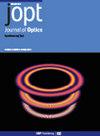鬼影成像中的分组正则化方法研究
IF 2.7
4区 物理与天体物理
Q3 OPTICS
引用次数: 0
摘要
鬼成像(GI)因其独特的优势而被广泛应用于各个领域。在采用旋转地层玻璃方案并利用二阶相关性进行图像重建时,由于需要对参考模式进行多次采样,成像效率受到了影响。为解决这一问题,人们采用了正交化方法来提高图像质量并减少所需的测量次数。原始的正交化方法虽然有效,但随着测量次数的增加,容易积累成像噪声和误差,导致图像质量显著下降。为了克服这一局限性,本文引入了分组正则化方法(GO-GI)作为正则化技术的扩展。通过调整 "组大小",该方法可以控制误差的累积,从而提高图像质量。以对比度-噪声(Contrast-to-Noise)对图像质量进行的评估表明,GO-GI 方法在模拟和实验结果方面都具有显著优势。这项研究证明,GO-GI 方法是地理信息领域一种简单而实用的方法。本文章由计算机程序翻译,如有差异,请以英文原文为准。
Research on the grouped orthonormalization method in ghost imaging
Ghost imaging (GI) has found application across diverse fields owing to its distinctive benefits. When employing the rotating ground-glass scheme and utilizing second-order correlation for image reconstruction, the efficiency of imaging is hindered by the multiple sampling of reference patterns. To address this, the orthonormalization method has been employed to enhance image quality and reduce the required number of measurements. Despite its effectiveness, the original orthonormalization method is prone to accumulating imaging noise and errors as the number of measurements increases, leading to a significant degradation in image quality. To overcome this limitation, this paper introduces the grouped orthonormalization method (GO-GI) as an extension of the orthonormalization technique. By adjusting the ‘group size’, this method enables control over the accumulation of errors, resulting in an improvement in image quality. The evaluation of image quality in terms of Contrast-to-Noise demonstrates the significant advantages of the GO-GI method in both simulation and experimental results. This study establishes the GO-GI method as a simple yet practical approach in the realm of GI.
求助全文
通过发布文献求助,成功后即可免费获取论文全文。
去求助
来源期刊

Journal of Optics
OPTICS-
CiteScore
4.50
自引率
4.80%
发文量
237
审稿时长
1.9 months
期刊介绍:
Journal of Optics publishes new experimental and theoretical research across all areas of pure and applied optics, both modern and classical. Research areas are categorised as:
Nanophotonics and plasmonics
Metamaterials and structured photonic materials
Quantum photonics
Biophotonics
Light-matter interactions
Nonlinear and ultrafast optics
Propagation, diffraction and scattering
Optical communication
Integrated optics
Photovoltaics and energy harvesting
We discourage incremental advances, purely numerical simulations without any validation, or research without a strong optics advance, e.g. computer algorithms applied to optical and imaging processes, equipment designs or material fabrication.
 求助内容:
求助内容: 应助结果提醒方式:
应助结果提醒方式:


